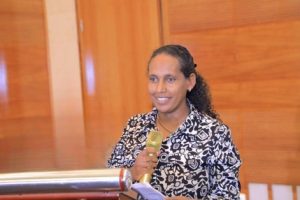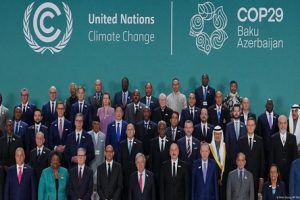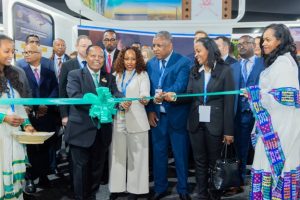Coal has recently joing the list of Ethiopias diverse energy sources. Dawuro Zone in the South Western Ethiopia State has emerged as a focal point for a groundbreaking coal project that promises to revolutionize the local economy and bring about a wave of positive change.
Coal, a fossil fuel renowned for its potential to generate large amounts of energy, has long been a vital resource for industrialization and power generation around the globe. Ethiopia, recognizing the untapped potential of its coal reserves, has embarked on an ambitious initiative to harness this energy source for the benefit of its people.
Dawuro Zone is home to significant coal deposits that have attracted the attention of both local and international investors. These coal reserves, estimated to be of considerable magnitude, hold the promise of driving economic growth and infrastructure development in that area.
Due to the fact that domestic coal output is mostly utilized for cement factories and contributes significantly to the country’s foreign exchange earnings, efforts are being made to enable potential investors to participate in the sector on a large scale.
Gebremariam Setegn, Director General of South West Ethiopia Region’s Mining and Energy Development Agency, told to The Ethiopian Herald that permission has been granted for the use of coal, building minerals, and specific small gold producer association, and the industry is actively working on it.
He mentioned that in the Dawuro Zone, 74 organizations have requested coal exploration permits, with 33 of them located in the Dauro zone and approximately starting their processes. Currently, 13 associations hold production licenses, but only seven of them have recently begun production.
In addition to Dawuro, coal exploration and development have also started in Konta, Kafa, Maji, and West Omo, with future surveys planned for the Shekana and Bench Sheko areas. These efforts are intended to use the potential resources in several sections of the region, not just in one area, he mentioned.
This project offers enormous potential for economic development and social progress. With responsible management and a commitment to sustainable practices, this venture has the power to uplift communities, creates employment opportunities, and provides the energy infrastructure needed to drive long-term growth. As the project unfolds, it will be crucial to strike a delicate balance between harnessing the benefits of coal and preserving the natural beauty and biodiversity of the Dawuro Zone.
The mining and use of coal is expected to bring in a wide range of job opportunities, ranging from mining operations to support services and subsidiary industries. These are the socioeconomic significance of the Dawuro Zon coal project. It is essential for reducing unemployment rates and promoting economic empowerment, especially for youthful individuals in the area.
In spite of the fact that the region contains minerals other than coal, he stated that to address some issues, efforts are being made to invite individuals with the necessary capacity to engage in the sector based on the associations’ needs.
He noted that despite the fact that there are 34 associations operating as gold miners in the area and 18 of them are set up as special small businesses, some of them have had their licenses suspended due to some issues with the miners. There are currently 21 associations operating in the gold industry, he added.
He mentioned that 4,500 employment opportunities in the industry were generated in the previous fiscal year, and more than 6,800 additional employment opportunities are expected to be added in this fiscal year. Moreover, 333 individuals have so far been successful in finding new employment in the mining sector in the region.
He said that more than 39 million birr was generated in the previous fiscal year from the whole mining in the region, and that 40 million birr is the goal for this year from the sector.
In addition to supplying the region’s increasing energy needs, the construction of coal-related infrastructure, such as power plants and transportation networks, will boost the economy in other areas. Better access to economical and dependable energy is expected to fuel substantial growth in sectors like manufacturing, agriculture, and tourism.
However, it is essential to strike a balance between economic prosperity and environmental concerns. The Dawuro Zone Coal Project must be implemented with a strong focus on sustainable practices, ensuring that the exploitation of coal resources does not compromise the ecological integrity of the region.
Fossil fuels such as coal have long been linked to greenhouse gas emissions and environmental harm. The extraction and burning of coal can lead to contamination of the air and water, hinder the preservation of biodiversity, degrade soil, and generate hazardous pollutants such as carbon dioxide and other greenhouse gases. Both the local ecosystem and global climate change may be significantly impacted by these environmental effects.
Furthermore, the Dawuro Zone is home to diverse and delicate ecosystems, including unique flora and fauna. The coal project must navigate the potential disruption and loss of biodiversity that could arise from mining activities and associated infrastructure development. Preserving the region’s natural heritage and ensuring the long-term sustainability of its ecosystems must be a priority throughout the project’s development.
Ethiopian governments are committed to environmental sustainability, and renewable energy is faced with the challenge of ensuring that the Dawuro Zone Coal Project stands by stringent environmental standards and biodiversity conservation practices. It is crucial to implement robust environmental impact assessments and mitigation strategies to minimize the ecological impact.
He remarked that ensuring the preservation of the Dawuro Zone’s natural heritage requires not only the regional government and other private companies to do thorough environmental impact assessments, but also the implementation of clean technology and strong mitigation techniques. The goal of the effort is to minimize its ecological impact while optimizing the revenue generated for the local community by utilizing advanced technologies and best practices, he added.
One of the main challenges, according to him, is striking a careful balance between fostering economic expansion and resolving environmental issues related to the extraction and use of coal. Additionally, the Dawuro Zone Coal Project can actually reach its potential while preserving the area’s natural resources for future generations by using strict planning and intelligent decision-making, he said.
Handling the effects of the local economy and society on the local communities provides another challenge. Ensuring that the rights and welfare of local populations are preserved, as well as that the benefits are divided fairly, is crucial, even when the coal project presents prospects for employment and economic expansion. For these issues to be resolved, adequate pay, ethical work approaches, and significant community involvement are essential, he added.
Besides, Ethiopia has led the world in the use of renewable energy, especially with its solar, wind, and hydropower initiatives. As the country strives to achieve its renewable energy targets, there is a need to carefully assess the role of coal in the overall energy mix and consider the potential for clean energy alternatives.
BY FIKADU BELAY
THE ETHIOPIAN HERALD TUESDAY 24 OCTOBER 2023





